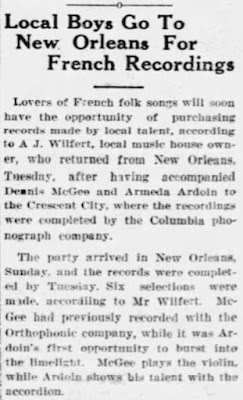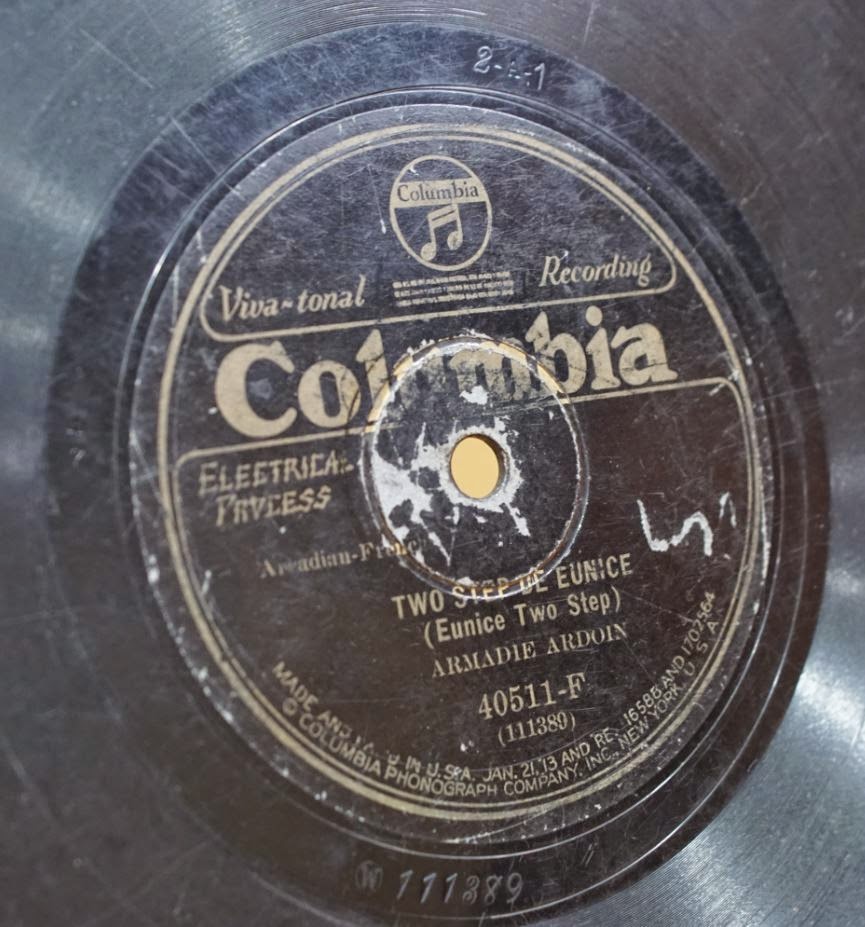In 1929, Columbia returned to New Orleans primarily to record the gospel singer Blind Willie Johnson. It was a joint field session between Columbia and Okeh under the direction of Okeh's A&R man and talent scout Polk Brockman. Ardoin and fiddler Dennis McGee accompanied "local Victorola and radio dealer" of Eunice named Andrew J. Wilfert Jr., perhaps staying in the hotel where the session was held. They recorded six tunes that day which were released on a small special series of Acadian French records. Amede (spelled "Armadie") sang and the accordion and the fiddle shared the lead. Many of the songs have become traditional standards including "Two Step de Eunice" (#40511).
 |
| Amede Ardoin |
Ardoin was an accordian virtuoso who, by all accounts, had an uncanny knack for improvising French lyrics with his strange high voice. The song's melody and influence can be found in other Cajun tunes such as the Jolly Boys of Lafayette's "Tant Que Tu Est Avec Moi ", Iry Lejeune's "Jolie Catin" (Pretty Doll), J.B. Fuselier's "Vien Don Ma Reguin (Come And Meet Me)", Virgil Bozman's "Tell Me If You Love Me", Lee Sonnier's "Chere Ici Et Chere La-Ba", and "Jolie Fille".
Hey quo faire jolie,
Comment j’vas faire, tu m’abandonnes ?
Comment j’vas faire ‘tite fille jolie ?
Toi t’as fais du mal.
Tous les samedi soir, catin,
Oh, je serais curieux d’être là
Pour voir ayou t’es, jolie mignonne,
Ouais mon cœur fait mal.
Rappelle-toi, quand t’as partie
Pour t’en aller, tu m’as quitté,
Tu me quittes derrière, jolie,
Comment tu veux que moi je peux faire.
Oh, mais toi catin,Si tu resterais si loin, ‘tit monde,Toi jolie, ça m’as fait du malQuand j’ai connu tout ça.Si t’es gone(?), toi mignonne,Partie te marier toi, catin,Tu connais ça, mais toi, jolie,Ça m’a fait du mal.Tout ce qui m’a reconsolé, jolie,Tu vas trouver ton erreur,Oui t’à l’heure, jolie,Pour ça , toi tu m’as fait.Toi jolie, moi je connais,Pourquoi, catin, mon cœur me fait mal.Quand je te vois, toi jolie,Je voudrais jamais te rejoindre.Ouais catin, tu vas revenirA me refaire tout ça tu m’as faitToi jolie, quand t’es partie,Tu m’as fait un tas du mal.Si tu connaitrais comment gros, jolie,Tu m’as fait du mal, toi catin,Tous les soirs, mignonne,Tu pourrais pas dormir.
 |
| Dennis McGee |
The word "catin" in Cajun french loosely translates to "little doll" with no sexual connotation while "tit monde" is an endearment, refering to someone as "my everything". While McGee's fiddling can be heard in the background, for some reason Columbia engineers failed to credit him on the record. The two play off of one another; McGee’s fiddle chases down Ardoin’s sprinting accordion in “Two Step de Eunice,” and elsewhere lays down a solid rhythm accompaniment to Ardoin’s riffing. The pair attracted so many people to their dances that a fence had to be erected between the performers and the dancers, to protect the musicians from the crowd.
 |
| Eunice News Dec 13, 1929 |
Hey pretty one
How am I going to make it, you've abandoned me?
How am I going to make it, pretty girl?
You've done a bad thing.
Every Saturday evening, little doll,
I desire to be there,
To see you pretty girl,
Yeah, i'm heartbroken.
Remember, when you leave
For you went away, you left me,
You left me behind, pretty girl,
How can I do this?
Oh, little doll,You stay so far away, my everythingYou're beautiful and it makes my heart ache,I know all about this.Where you're gone, you're cute,Let's get married, little doll,You know this, pretty girl,That I'm heartbroken.What consoles me, pretty girl,You'll realize your mistake,Yes, you still have plenty of time,For what you have done to me.You're beautiful, I know this,Why little doll, my heart hurts.When I see you, you're beautiful,I would never try to meet you.Yeah little doll, you're leaving again,Repeating everything you've done to me,You're beautiful even though you're gone,You've made me heartbroken.If you knew how big, pretty girl,You've made my heartache, you little doll,Every night, cutie,You wouldn't be able to sleep.
Musician Boozoo Chavis recalls those songs on 78s:
My uncle had that record, the Eunice Two Step. Everyone had Amede's records. Boy, that man had a fine voice. That's pure Frenchman from the heart.
Clifton Chenier would later use the melody as the basis for the song "Sweet Little Girl". Ardoin’s songs have entered what we might call the social domain; songs like “Two-Step de Eunice” and “Les Blues de Prison” have been passed around and reinterpreted for generations, and are genre standards. Iry LeJeune began perfoming Amédé Ardoin’s songs on accordion to the delight of Cajuns just returning home from World War II, alienated and anxious to be reunited to their home culture. It’s no stretch to say that LeJeune’s popularity—and Ardoin’s songs—pulled Cajun culture from the brink of extinction.
- The Kingdom of Zydeco By Michael Tisserand
- http://www.motherjones.com/mixed-media/2011/03/amede-ardoin-cajun-zydeco-mardi-gras
- http://www.aquariumdrunkard.com/2011/05/17/amede-ardoin-mama-i%E2%80%99ll-be-long-gone-the-complete-recordings-1929-1934/
- Hidden in the Mix: The African American Presence in Country Music edited by Diane Pecknold
- Lyrics by Marc Chaveau
Find:
Amadé Ardoin – Louisiana Cajun Music Vol. 6 : Amadé Ardoin – The First Black Zydeco Recording Artist (1928–1938) (Old Timey)
Cajun Dance Party: Fais Do-Do (Legacy/Columbia, 1994)
Cajun Louisiane 1928-1939 (Fremeaux, 2003)
Amadé Ardoin – Louisiana Cajun Music Vol. 6 : Amadé Ardoin – The First Black Zydeco Recording Artist (1928–1938) (Old Timey)
Cajun Dance Party: Fais Do-Do (Legacy/Columbia, 1994)
Cajun Louisiane 1928-1939 (Fremeaux, 2003)
Cajun Capers: Cajun Music 1928-1954 (Proper, 2005)
Cajun Country, Vol. 2, More Hits from the Swamp (JSP, 2005)
Prends Donc Courage - Early Black & White Cajun (Swamp Music Vol. VI) (Trikont, 2005)
The Best Of Cajun & Zydeco (Not Now, 2010)
The Perfect Roots & Blues Collection (Sony, 2015)
Cajun Country, Vol. 2, More Hits from the Swamp (JSP, 2005)
Prends Donc Courage - Early Black & White Cajun (Swamp Music Vol. VI) (Trikont, 2005)
The Best Of Cajun & Zydeco (Not Now, 2010)
The Perfect Roots & Blues Collection (Sony, 2015)

Great post as always sir.
ReplyDelete